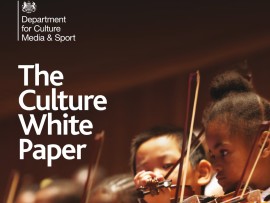Membership body representing the UK’s creative industries warns that more clarity is needed on the final relationship and how this will effect ease of movement and trade of services for the creative industries.
More than 100 artists, including 15 Turner Prize winners, have called on the government to scrap the EBacc which critics claim is sidelining arts subjects in English secondary schools.
The £150m Creative Industries Sector Deal supports the development of creative clusters and the roll out of a creative careers programme but prioritises digital businesses over culture. Arts Professional’s Liz Hill reports.
Why Collect?, commissioned by Art Fund and the Wolfson Foundation and written by the historian Sir David Cannadine, calls for more financial support from central government for the UK’s museums and art galleries.
An open letter has questioned the appointment of Rupert Murdoch’s daughter to Arts Council England’s governing body and called for the decision to be reversed, condemning the appointment as against the stated values of the arts funding body.
Entries for GCSE arts subjects are down 9% on 2016, while entries for EBacc subjects are up 9% in the same period. Arts Professional’s Christy Romer reports.
Unions including UNISON, UNITE, the PCS and the Writers’ Guild of Great Britain organise national march in London starting from the British Library and ending with a rally outside the National Gallery.
A new 73-page Brexit Report from the Creative Industries Foundation draws on evidence provided by its members in order to present a series of recommendations to government as well as highlighting the challenges that lie ahead for the sector.
As the New Art Gallery Walsall, opened in 2000 and home to the Garman Ryan Collection of over 300 Jacob Epstein sculptures, is threatened with closure, the artist Bob and Roberta Smith expresses his dismay at its possible demise.
New Prime Minister Theresa May’s inaugural cabinet sees former accountant and tax manager Karen Bradley take on the portfolio for culture, media and sport.
A dispute over the number of pupils taking arts subjects at GCSE was at the heart of a House of Commons debate, with the Department for Education using figures which include students studying arts AS Levels in sixth forms. Arts Professional’s Christy Romer and Frances Richens report.
The decline in the take-up of arts subjects at GCSE has increased five-fold over the past year, coinciding with a dramatic rise in young people studying EBacc subjects. Arts Professional’s Liz Hill reports.
Reaching the milestone of 100,000 signatures means a petition calling for arts subjects to be included in the EBacc will now be considered for a Commons debate.
Culture minister Ed Vaizey has announced the publication of The Culture White Paper, the first government white paper on culture in England for over 50 years.
Despite a further £3.5 billion of cuts planned for 2019-20, George Osborne’s Budget has also dropped a few strategically placed funding packages and a tax reduction for the self-employed.
The Museums Association Cuts Survey 2015 suggests that funding cuts are putting museums under increased pressure, with more pain to come as local authorities attempt to balance their decreasing budgets.
Chancellor George Osborne delivers Autumn Statement and Spending Review, outlining cuts to government departments, whilst promising increased funding for the Arts Council.
Initiated by a-n and CVAN, with contributions from Scottish Artists Union, Engage and other key organisations, the visual arts sector has made a joint submission to the Treasury Spending Review outlining a number of key recommendations to help better support the sector.
Event in London brings together raft of speakers from across the arts sector to discuss funding priorities, partnerships and access – with a welcome focus on the artist.
The final report of the Warwick Commission inquiry finds the future of cultural value as lying in a seamless relationship between the cultural sector and the creative industries, coupled with a focus on enterprise and creativity in schools. Liz Hill and Frances Richens report.




















